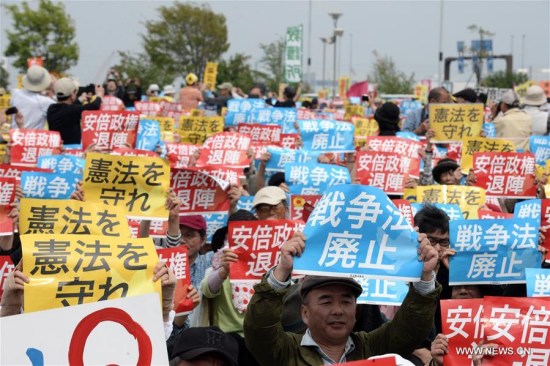
Citizens holding placards attend a protest rally in Tokyo, Japan, May 3, 2016. Some 50,000 people rallied in Tokyo on Tuesday on the occasion of the 69th Constitution Memorial Day of Japan to protest against Japanese Prime Minister Shinzo Abe's unwanted attempts to amend the nation's pacifist Constitution. (Xinhua/Ma Ping)
The Golden Week string of national holidays in Japan are eagerly anticipated annually by young and old in Japan at this time of the year, the former who get a break from school and the rigor of study, while workers, their families and retirees often plan stints away at onsen hotels, or short trips to easily accessible places like Okinawa, Guam and Saipan.
For many Tokyoites however, with travel agencies severely hiking plane and Shinkansen bullet train tickets at this time of year, lavish holidays are out of the question and a lot of the city's hardworking masses are quite happy to simply put the breaks on, switch the PCs and work phones off and enjoy, quite simply, doing nothing.
But while a whole lot of doing nothing in the capital is a perfectly acceptable way for urbanites to spend one's Golden Week, as is lying on a beach in St. Lucia or enjoying Michelin-rated cuisine on the French Riviera for the more affluent, each national holiday carries its own special designation and historical or cultural context that society is expected to observe, in some instances, or simply contemplate, in others.
April 29, for example, is Showa Day in Japan and marks the start of the run of national holidays each year and many think back to issues of history.
In the middle of Golden Week, May 3, is garnering the most attention this year, as this day is Constitution Day (known in Japanese as Kenpo kinenbi) and it was on this day in 1947 that new postwar constitution was put into effect, with the day meant to be a mixture of solemn contemplation as well as celebration of the promulgation of the pacifist Constitution, which for the past 70 years has ensured that Japan has been a peaceful country.
This special day, however, could be irrevocably changed in the near future, with the peaceful holiday taking on a far less untroubled if not bellicose meaning, as Japanese Prime Minister Shinzo Abe has been busying himself with his sole political goal of amending the country's war-renouncing constitution and firing up Japan's dormant war machine that was intentionally shut down by the Allied Forces at the end of WWII due to the potential it had proved to wreak havoc on its Asian neighbors in ways so barbaric as to almost defy description.
But fast-forward 70 years and Abe is on the precipice of achieving his goal of amending Article 9 of Japan's Constitution, which stipulates, in essence, that Japan may not maintain forces with war potential, or use war as a means to settle international disputes. It also unequivocally abnegates war, and this pacifist stance has been embraced by the vast majority of Japanese citizens for decades.
After Abe's Cabinet unilaterally decided to reinterpret Article 9 last year, contentious war bills were then forced though both of parliament's chambers by exploiting his ruling coalition's majority, despite opposition parties' views not being taken into consideration and negotiations on the topic cut short, and in spite of a monumental backlash from the Japanese public that saw protests up and down the nation, with numbers and an intensity not seen on the streets in restful, affable Japan, in decades.
The war bills have now been enacted and theoretically the military's operational scope can be demonstrably augmented and Japanese forces can be seen to fight in active theaters alongside its allies overseas, as well as further flex their military muscles in locations and territories closer to home.


















































